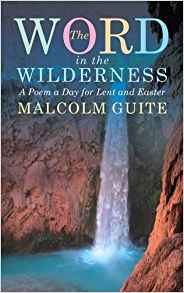The Word in the Wilderness:
A Poem a Day for Lent and Easter
by Malcolm Guite
–Review by Teri Hyrkas
It might seem a little unusual to read a poem a day as a devotional practice during Lent, but with poet/priest Malcolm Guite as docent and The Word in the Wilderness: A Poem A Day for Lent and Easter (Canterbury Press, 2014) as the text, rest assured that the time spent reading and considering each poem will be full of rich rewards.
Designed to serve as a pilgrimage through Lent, Guite begins The Word in the Wilderness on Shrove Tuesday, the day before Ash Wednesday. The author sets the stage for the pilgrimage with a piece by one of his favorite poets, the late Seamus Heaney. The composition, Station Island XI, contains within it a translation of a poem by St. John of the Cross. St. John’s poem, originally written in Spanish, was given to Heaney to translate by a priest who told him, “Read poems as prayers.” At the conclusion of Heaney’s poem, Guite explains that the piece helps us to see that all we have muddied and misused in our life can be restored. “[Cleansing] of the instrument of our vision by the power of [Heaney’s] imagination as a poet is part of that whole restoration….“ Guite goes on to say, “Perhaps we can see our own Lenten pilgrimage as a journey upstream to the source of that ‘fountain, filling, running’ that is celebrated in this poem.”
Malcolm Guite, who is a scholar of poetry, a member of a rock band and Chaplain of Girton College Cambridge, has chosen both ancient and modern poems for his anthology; his own poetry also appears in The Word in the Wilderness. Guite has divided the Lenten poetry journey into seven parts, and, he explains, this is not a solo excursion: “Our journey through the chosen wilderness of Lent, indeed our wider journey through life, is a companioned journey. We are not alone. We have friends and companions in this world and life who are making a similar journey, our comrades in the faith, we have the great cloud of witness, the saints who have walked these roads, completed the journey and from the shores of heaven encourage us in the walk of faith, and we have the Lord himself….”
In the third week of Lent, Guite has chosen to feature portions of Dante Alighieri’s The Divine Comedy. This is a wonderfully relevant use of the poem since Dante’s time setting for the Comedy is from Good Friday through Easter. In addition, because the ancient poet Virgil and Dante’s dear friend, Beatrice, are pivotal to Dante’s spiritual journey in the Comedy, Guite says, “The poet who models companionship most brilliantly… is Dante.”
Guite also tells us, “[Dante] shows how the best in us can become darkened and destructive, but also how it can be purged and redeemed, and finally how our capacity for joy and wonder, for growing in light and love, will expand and deepen as we draw closer to the source of all light and love in the heart of God.” The author has taken the passages of The Divine Comedy from a new translation by Robin Kirkpatrick (Penguin Classics, 2013). Guite assures the reader that “there is no need to be familiar with [Dante’s] whole poem to appreciate this section; however, I hope readers may be inspired to pick up threads of Dante’s great poem and pursue it for themselves at their own pace afterwards.”
The final actual entry in The Word in the Wilderness (there is an Appendix which contains several other poems) is the beautiful poem Easter by George Herbert. It begins:
“Rise heart; thy Lord is risen. Sing his praise
Without delays.
Who takes thee by the hand, that thou likewise
With him mayst rise.”
In his comments on Herbert’s poem Guite writes: [Herbert] has sung the [57th psalm] in his ‘common prayer,’ his public worship, and now he is applying it within himself and to his whole day. But as so often in that application the personal becomes the present, the tactile, the deft, the courteous. The risen Christ of Easter is not, in this first verse, the cosmic Pantocrator but the familiar friend or lover who offers you a hand as you rise in the morning.”
Throughout The Word in the Wilderness Guite makes clear the obscure poetic passages and explains words and phrases which are archaic or no longer in use. The author also provides commentary on the poetry but refrains from rigid interpretations of any of the poems, including those which he wrote himself. Rather, he offers suggestions for musings that allow the reader to make connections with the gospel narrative and with symbols and practices of the Lenten season.
Guite closes the introduction to The Word in the Wilderness: A Poem a Day for Lent and Easter with these words: “I hope that among these different voices some will speak personally to you, and that amid the music of the poetry you will find phrases that will feed your soul, images that might become icons, windows into heaven to light your journey and welcome you home.”
If you haven’t yet chosen a book to be a part of your Lenten devotions, don’t be discouraged. As spiritual director Tara Owens says: “It’s never too late for Lent.” Perhaps The Word in the Wilderness is the perfect Lenten devotional book for you.

